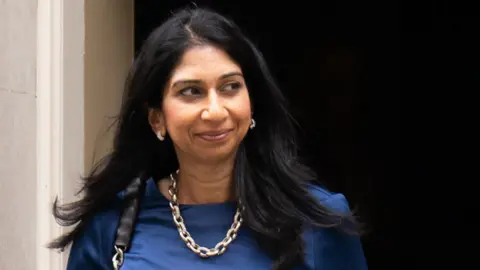Rishi Sunak decides not to order inquiry into Suella Braverman speeding row
 PA Media
PA MediaRishi Sunak has said Suella Braverman's handling of a speeding offence did not breach ministerial rules and would not be investigated.
The home secretary was caught speeding last year and asked officials for advice on arranging a private course.
Opposition parties had called for an inquiry into whether she had breached ministerial rules.
But after discussion with his ethics adviser, Mr Sunak said he thought an investigation was not necessary.
In a letter to Mrs Braverman, Mr Sunak said he had decided "these matters do not amount to a breach of the ministerial code", after speaking to Sir Laurie Magnus, who advises the government on ethics.
Mr Sunak said while action could have been taken to avoid "the perception of impropriety", he was nevertheless reassured that Mrs Braverman took "these matters seriously" and had "expressed regret".
Mrs Braverman was caught speeding in June 2022, while she was attorney general, and given the option of three penalty points or a group speed awareness course.
She later accepted a fine and penalty points on her driving licence for the speeding offence.
Mrs Braverman came under scrutiny, not over the speeding offence itself, but over whether she breached ministerial rules, by asking officials to help her with a private matter.
The ministerial code requires ministers to ensure "no conflict arises" between their public duties and their private interests.
In her letter to Mr Sunak, Mrs Braverman said she regretted speeding but insisted "at no point did I try to avoid sanction".
"My actions were always directed toward finding an appropriate way to participate in the speed awareness course, taking into account my new role as home secretary and the necessary security and privacy issues that this raised," Mrs Braverman wrote.
Braverman quips
Earlier this week, as Mr Sunak came under pressure to order an investigation into the matter, the home secretary said she was "confident nothing untoward happened".
The Liberal Democrats have branded Mr Sunak's decision "a cowardly cop-out".
"Sunak is too weak to even order an investigation, let alone sack his home secretary," Liberal Democrat chief whip Wendy Chamberlain said.
In a string of quips at Prime Minister's Questions, Labour leader Sir Keir Starmer took aim at Mrs Braverman, suggesting Mr Sunak was too weak to sack her.
Referencing a speech in which Ms Braverman suggested ways to bring down immigration to the UK, Sir Keir said the home secretary's "big idea is for British workers to become fruit pickers".
Sir Keir asked the prime minister if he wished had the strength to give Mrs Braverman "a career change of her own".
In reply, Mr Sunak said this week's forecast by the International Monetary Fund showed the Conservative government was "delivering for the British people".
Mrs Braverman - a popular figure on the right-wing of the Conservative Party - resigned as home secretary in October last year after admitting breaches of the ministerial code during Liz Truss's short-lived premiership.
She returned as home secretary after Mr Sunak became prime minister, and has been spearheading his government's efforts to curb the arrival of migrants on small boats.
Security concerns
In her letter to the prime minister, Mrs Braverman explained the circumstances of her speeding offence in more detail.
She said she decided to take the speeding course and had booked a slot, but after being made home secretary in September, she asked officials whether the group session was appropriate "given my new role".
Mrs Braverman said that in discussions with her principal private secretary (PPS), she was advised that the Cabinet Office's Propriety and Ethics Team (PET) would be "the best source of advice on whether it was appropriate to seek to do the course in a way that protected my privacy, security, and was least disruptive to the course participants and provider".
The PET then advised it was "not an appropriate matter for civil servants to take forward", Mrs Braverman said.
Following further discussions with her special advisers, who "contacted the course provider to better understand the range of appropriate options that might be available", she opted to take the points and pay the fine.
She added: "I recognise how some people have construed this as me seeking to avoid sanction - at no point was that the intention or outcome.
"Nonetheless, given the fundamental importance of integrity in public life, I deeply regret that my actions may have given rise to that perception, and I apologise for the distraction this has caused."
